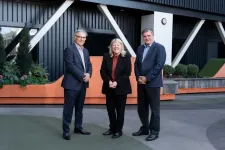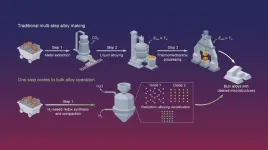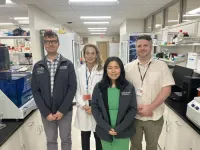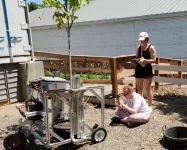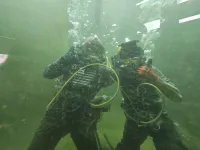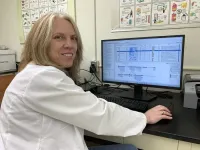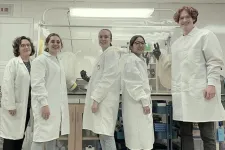An outstanding $21 million philanthropic investment will establish a pioneering research centre to advance precision diagnosis for diseases that affect millions of Australians.
The Colonial Foundation Diagnostics Centre will use cutting-edge ‘spatial biology’ technologies to deliver enhanced diagnosis and, in turn, personalised care for patients with inflammatory diseases, like rheumatoid arthritis and inflammatory bowel disease.
The centre, co-led by WEHI and the Royal Melbourne Hospital, and funded by the Colonial Foundation, builds on an existing partnership that has pioneered potential new tests for detecting early-stage dementia.
At a glance
A $21 million philanthropic investment will establish the Colonial Foundation Diagnostics Centre, a partnership between WEHI, the Royal Melbourne Hospital and the Colonial Foundation.
The centre builds on the achievements of the Colonial Foundation Healthy Ageing Centre, which the three organisations established in 2019 to pursue a blood test for dementia.
The Colonial Foundation Diagnostics Centre expands this focus to include inflammatory diseases. It will partner WEHI’s nation-leading spatial biology technology with artificial intelligence and machine learning to deliver more accurate and rapid diagnosis.
Around one-in-ten Australians have a chronic inflammatory disease, like rheumatoid arthritis, inflammatory bowel disease, multiple sclerosis and lupus. Over 400,000 Australians have dementia, two-thirds of whom are women.
Diagnostic tests that better detect, categorise and monitor these diseases are sorely needed. Improved diagnostics would help patients along their treatment journeys which can be long due to imprecise testing options currently available.
The centre will combine the RMH’s clinical capabilities with WEHI’s nation-leading, comprehensive suite of spatial biology technologies, and the skilled scientists who use them, to enable precision medicine and improve patient outcomes.
Spatial biology (or spatial omics) is a revolutionary approach to understanding disease, that uses sophisticated imaging to allow scientists to explore cells in tissue samples without disturbing how they would be naturally positioned in the body. This provides a deeper understanding of disease progression and helps identify potential treatment targets.
Future tech to the clinic
WEHI director Professor Ken Smith said the Colonial Foundation Diagnostics Centre would seamlessly integrate WEHI’s pioneering technologies with clinical practice at the Royal Melbourne Hospital, one of the institute’s longest-standing partners.
“Cutting-edge spatial biology technologies allow us to understand diseases at unprecedented resolution, make fundamental discoveries directly from patient samples, and can equip doctors with the information they need to make the best diagnosis,” said Prof Smith.
“WEHI and the Royal Melbourne Hospital share a deep and historic partnership, and the Colonial Foundation Diagnostics Centre will allow us to continue our close relationship and pursue our shared goals of improved knowledge and patient outcomes.
“Our sincere thanks to the Colonial Foundation for their vision and generosity with this long-term investment – our scientists can’t wait to get to work.”
The Royal Melbourne Hospital Chief Executive Professor Shelley Dolan said the centre will expand the deep scientific and clinical partnership between the hospital and WEHI, to bring precision treatments to patients with inflammatory and other diseases.
“The Colonial Foundation Diagnostics Centre will enable our teams to gather in-depth information from the blood tests and biopsies we perform on patients, allowing us to better understand their disease and provide improved personalised care,” Prof Dolan said.
“We are delighted to be continuing our close and ongoing partnership with WEHI - and proud that this work will help aid in disease discovery, diagnosis and the translation of results into the best treatments for patients with inflammatory and other diseases.
“By working together, we can ensure the Centre's research targets the most important problems our patients face.”
Better diagnosis, better treatment
Current diagnostic tests can provide an incomplete picture of disease, making it hard for doctors to treat promptly and with precision, leading to delays in accessing the best quality therapies. In many cases, multiple tests are needed to make a diagnosis.
The centre will discover new biomarkers of disease, equip doctors with the best information available, and make it more likely that more accurate results can be derived from a single test – delivering tailored treatments to patients, faster.
The centre will also harness rapid advances in artificial intelligence and machine learning to quickly process and learn from the large datasets generated.
Diagnoses that would have required extensive and invasive clinical testing – over days, weeks, even months – will be possible in a fraction of the time and with limited intervention, accelerating the circuit from disease discovery, to treatment.
Getting well, sooner
The centre builds on the foundations of the Colonial Foundation Healthy Ageing Centre (CFHAC), established by WEHI, the Royal Melbourne Hospital and the Colonial Foundation in 2019.
CFHAC’s achievements include building the world’s largest dataset of proteomics, or protein-focused analysis, of clinical samples of diseases related to ageing, and discovering a potential new blood test for early-stage dementia.
Colonial Foundation CEO André Carstens said the Colonial Foundation Diagnostics Centre would expand and enhance the discovery work of CFHAC, some of which is already being applied in the hospital setting.
“We have a bold vision to develop new kinds of diagnostic tests to detect common inflammatory diseases and dementia, and even to determine which patients are most at risk of organ transplant rejection. It’s our hope these tests will revolutionise how these conditions are detected and treated,” said Mr Carstens.
“We are thrilled to expand our partnership with WEHI and the Royal Melbourne Hospital in the internationally leading Melbourne Biomedical Precinct in the pursuit of better health outcomes for the entire community.”
Mr Carstens said further funding from other foundations, donors and philanthropists was encouraged and would greatly assist the centre in meeting its ambitious aims.
“The security of long-term funding allows doctors and scientists to get on with their essential and important work, and we feel privileged to be able to provide them with this level of support,” he said.
END
